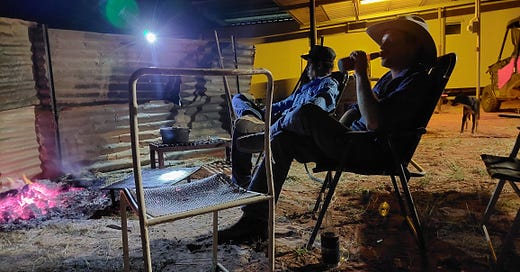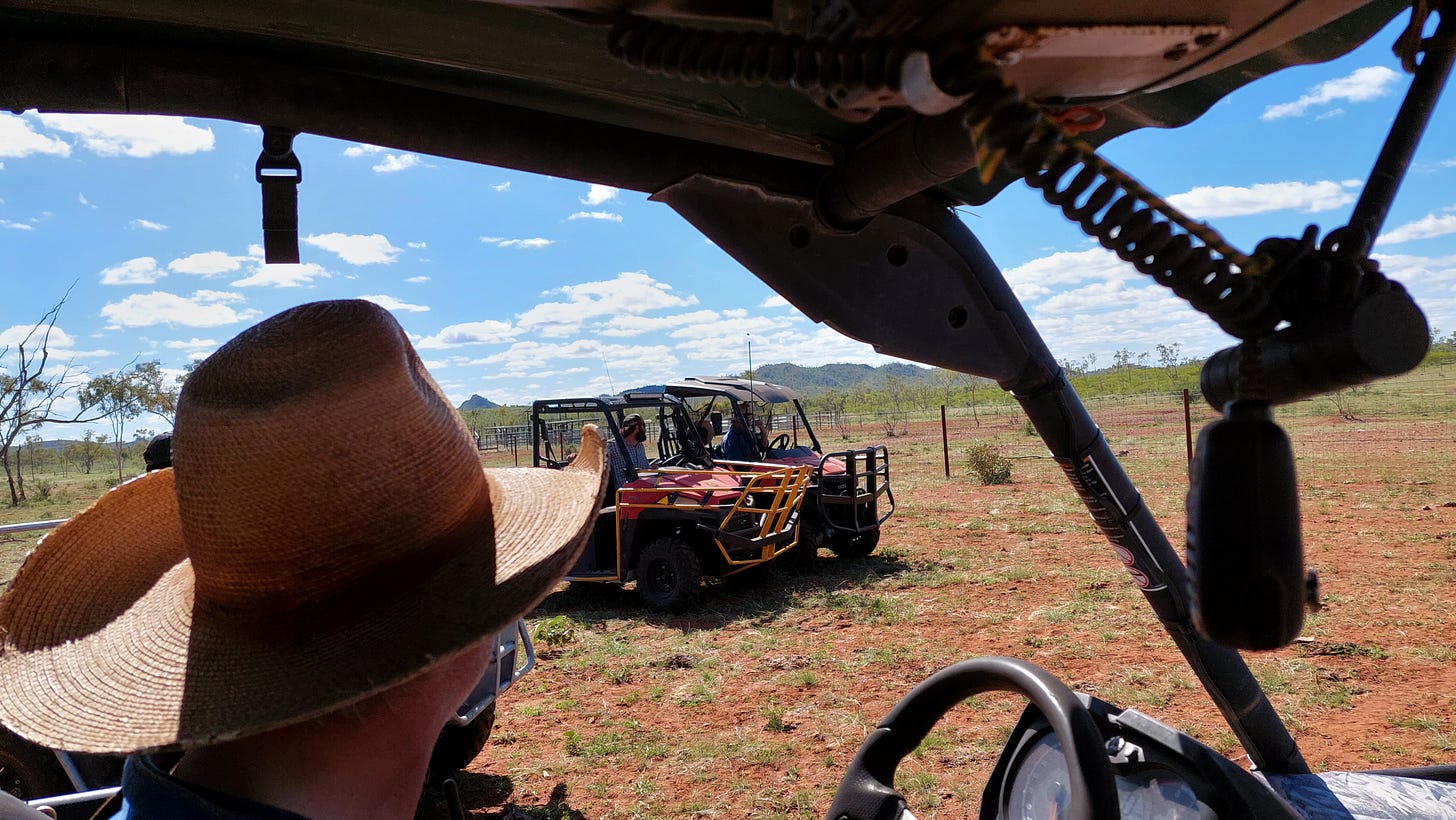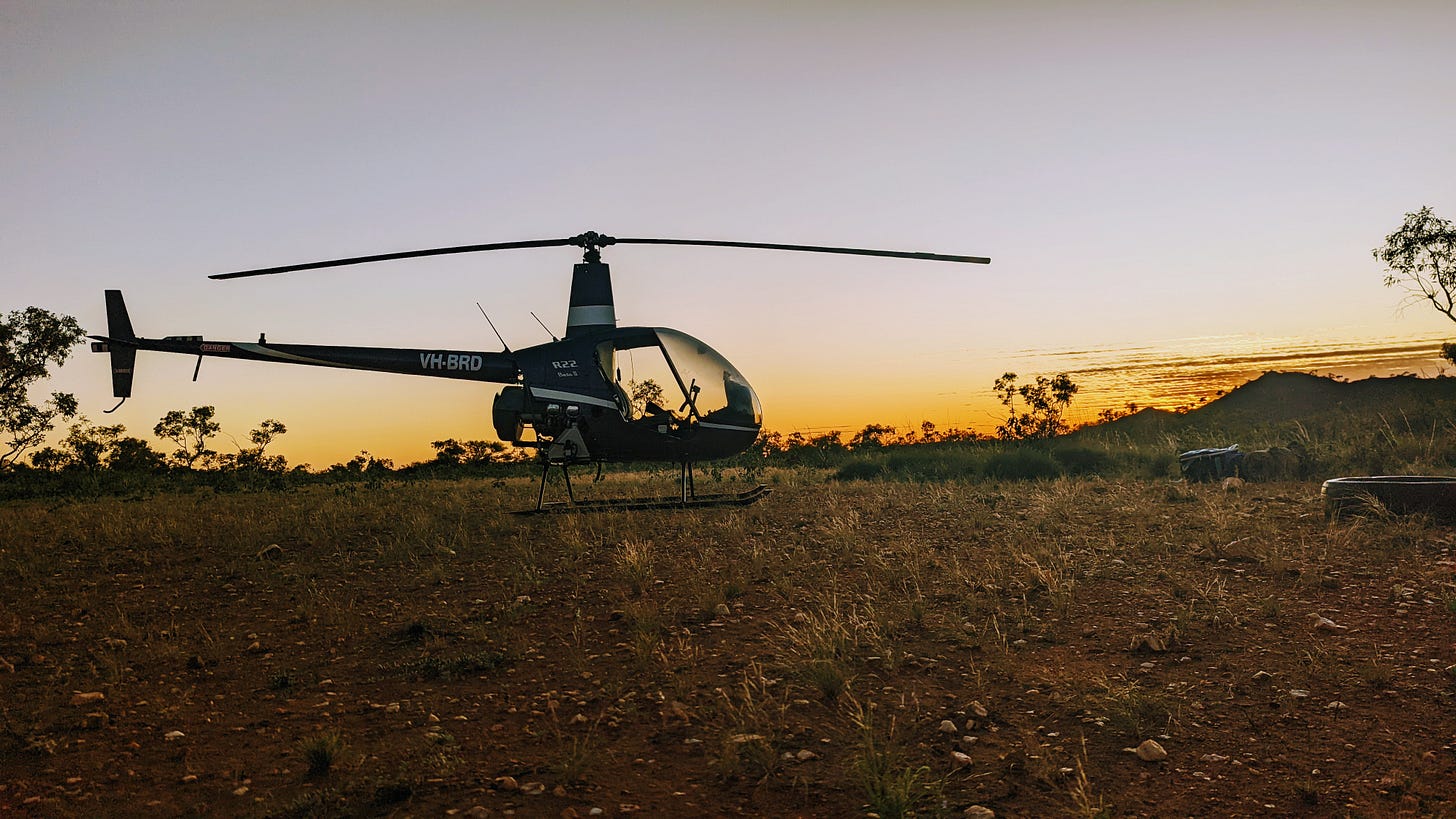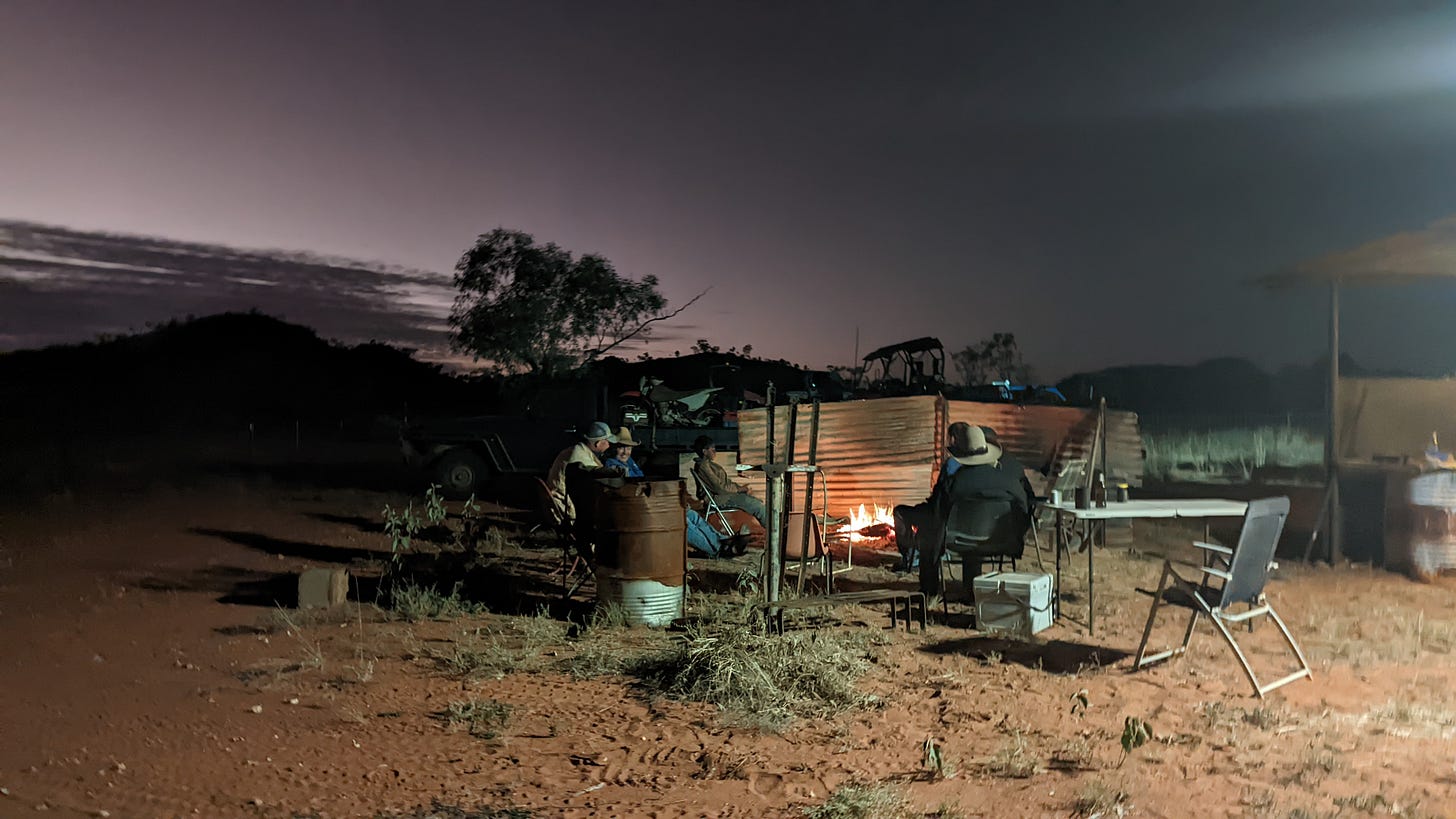Somewhere close but unreachable, a curlew is wailing like a soul lost in the night, and as I lay in my swag I understand that thanks to covid, and all of its bullshit, this bird is now singing my song.
Today I’ll be tagging along with Luke and these other ringers as they muster cattle on a remote and rugged property in Mt Isa. It’s 5.30 am, that day starts now.
After taking a piss, the dawn reveals the gum tree covered, iron ore hills that I couldn’t see when we arrived last night. To me they look like the fossilized remnants of a taller range; vertebrae that time keeps cracking but as yet failed to remove them from the landscape like it used its own history to remove them from the view.
Near the donga, with the camp kitchen inside, the ringers are yawning as they haunt the rekindled fire. Thinner than bones, they have camp coffees in their hands, this dirt in their skin, and rollies in their lips as they watch the fire with a reverent silence, their jacket collars up to shield their necks from the chill.
One of them is a helicopter pilot and today I will watch him fly all over this range like a dragonfly with a death wish.
Luke told me that these flyers operate in what other helicopter pilots call the death curve. If anything goes wrong, they will be so close to the ground, there will be no time to do anything but leave us. Yet despite a life of constant risk the pilot is a quiet man, even his reactions seem too slow and considered for his line of work, and although he’s friendly and laughs at the wit of the other men and even the few jibes aimed at him, jibes he does not return, the flames reveal a curlew in his eyes, and whatever he’s searching for isn’t in this fire.
Last night I approached him for an interview, but he didn’t want to share his story. This morning though he tells me how he spends upwards of six months living in his tiny flying machine, travelling all over the upper half of this hard vastness, alone, seeing landscapes that perhaps only he will get to see, for the sun and shadow constantly change it. Then, come evening, for he is not allowed to fly at night, he’ll land near a homestead, where country hospitality will see them offer him a bed or, if he is too far out, he’ll land out here, in the remote bush, then after pulling out his swag from the passenger seat, he’ll sleep under the dark emu and her pale and milky wash.
The helicopter has no doors, no heater, and there is no altimeter or speedo. There is just a stick, a few switches, two plastic seats, himself and a .22 rifle holstered between the seats. That’s for the cattle that falter as they flee from his blades and or the wild dogs.
He’s licenced to fly several helicopters, including the six seaters they use to fly riggers out to the offshore oil rigs, but he prefers the mustering, for out here, he has no one looking over his shoulder and when I asked him, he told me that he never gets sick of the view. In fact that’s one of the main reasons he’s here, he said; a lonely spectator to God’s more isolated work.
He started flying when he was nineteen, now in his mid fifties, he talks about his partner, his wife with respect and a fondness. She’s out there somewhere looking after their finances as he stands here huddled in his jacket, half lit by the fire, and a silhouette against the dawn as he waits for the station owner to arrive with the plans for the day.
Soon I will watch him vanishing over the remnants of mountains, flying through the trees, so close to the ground and at a speed that even though I’ll be watching it, I won’t believe it. There is a border between life and death and this man will spend his working hours tearing across it, backwards, forwards, up and down; A ringer in the sky herding more cattle into the pens than all these ringers, in their scratched and dented four-wheel drive buggies, put together.
It’s also his job to chase down the cows that manage to evade these ringers and using fear, coerce these cattle back to the compliant even defeated, herd.
The only man-made thing I’ve seen fly with greater dexterity is a drone, and that’s what’s coming to replace him.
The cost of his services are steep as is the cost of petrol, and that is rising. By comparison, drones are a dime a dozen and if they fall out of the sky no one dies and for the cost of a helicopter they could replace him with hundreds.
Luke told me that they were already trialing them on some stations, and a few days later on the road to Normanton, even our little drone, that we call ASIO, will manage to scare an entire herd of cows.
If that evolution happens most of Australia will never hear about it, and those that do will marvel at the cleverness of the drones and even agree that it’s far safer and cheaper, leaving only these ringers, and others like them on other homesteads, to periodically bring up his name and celebrate his exploits around campfires battling to offset the darkness and the cold.
On a break though he takes one of the ringer’s son up for a quick joy flight, zooming him over the trees and the broken hills in a series of moments that will become for the boy, a defining memory, as down here these dust covered ringers laugh at their jealousy, as the cattle, in their holding pen, huddle together as they study the fences and these men who, grouped around their buggies, hunt the sky for the chopper, unaware, as they roll their cigarettes, to how, in this age of compliance, how rare they are; these descendants of unknown heroes, these apostles of the gums, these hard-working, free loving, cattle mustering men with balls.
Michael Gray Griffith
Full Video of the day here: A Day in the Life Of Mt Isa Contract cattle Musterers









What a life they lead out there.You make it so real Michael.I could almost have been there.
Beautifully written, painted with words - it felt like I was actually there. Thanks for sharing!